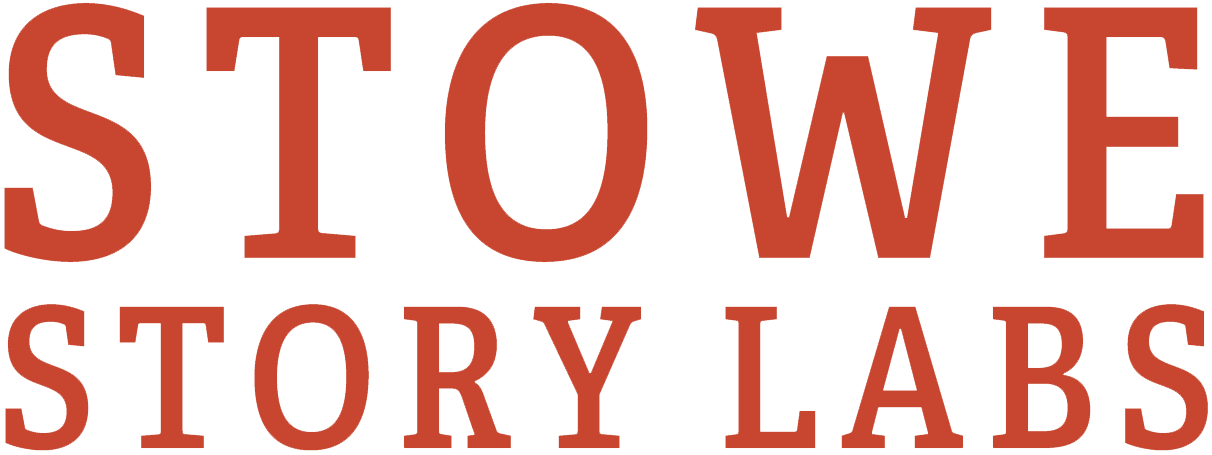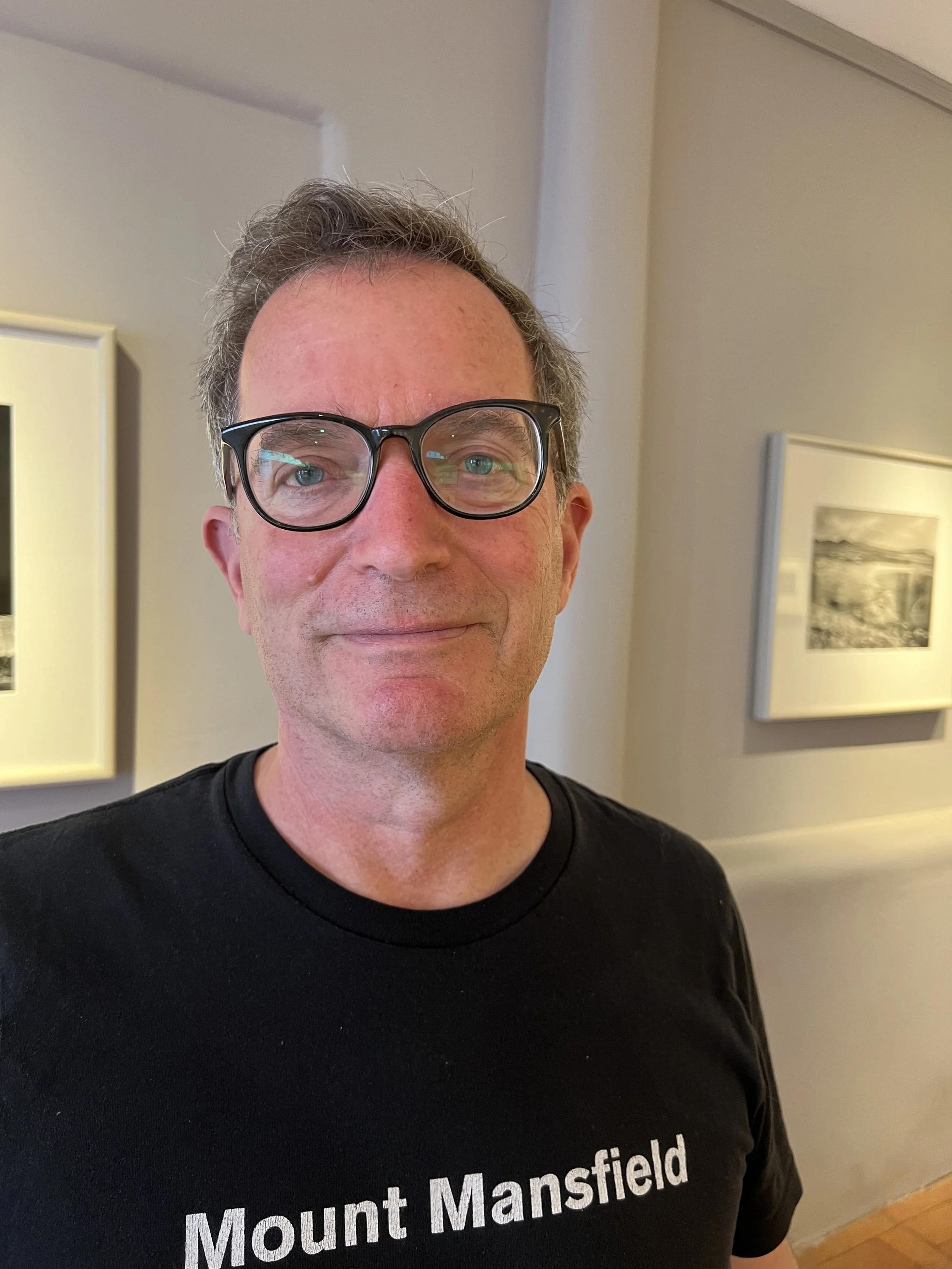ICE TOWN — Thawing the fundraising process through fiscal agency.
In-Conversation Interview with Filmmaker Emily Mansfield and Producer Molly Loftus. Taking advantage of Stowe’s fiscal agency program to make a documentary short about one of the last ice harvests in America.
by David Rocchio
DR: We are excited to start our fiscal sponsorship with you. Can you tell us a bit about the project you'll be developing with us?
Winter waters for Harvesting
Team: We are so excited to partner with Stowe Story Labs for Ice Town, a documentary short film about ice harvesting in the town of Holderness, New Hampshire. Nestled between the foothills of the White Mountains and the shores of the Squam Lakes, Holderness, New Hampshire (population 2,000) is a town centered around the old practice of ice harvesting, which happens each year at Rockywold Deephaven Camps. Every winter, when the lakes freeze over, people cut the ice into big blocks. An ancient practice, the harvested blocks of ice are used to this day to keep food cold even after the weather heats up. The camp also uses their ice blocks to cool rooms during summer. There are benefits to this approach over modern methods, as the ice saves energy and creates comfortable cabins!
But as the years go on, town members worry about the future of their beloved ice practices. Firstly, with environmental factors making it harder to harvest the ice, it becomes less frequent that the lake freezes completely over. Secondly, commitment to the practice has waned, especially with the younger generation.
However, the younger generation plans to keep it alive despite the environmental obstacles.
DR: I understand you are shooting now, given ice waits for no man (to borrow a phrase). How does the community take to being documented? What is like shooting on the ice, and what have you learned from this process?
Team: The community members that we have met are excited to share their ice harvesting tradition experiences with us. Rockywold Deephaven Camps, where the ice harvesting happens this year, has been featured on many news channels in the past, so the staff has grown accustomed to participating in interviews from time to time.
Shooting on ice presents unique challenges and exciting opportunities. For one, we need to prepare for freezing temperatures and high winds, which means a lot of added gear and hand warmers! Most of all, making sure we have the right footwear and crampons for traction on the ice is of high importance for our entire crew. With shoots like this, supporting each other and moving slower than normal is essential to make sure we're safe.
In this process, we've learned that there's truly no such thing as being over-prepared. Being in the cold elements and out in the wilderness means there's little room for forgetting things like batteries, so our whole team is constantly triple checking all of our gear ahead of time!
DR: I’ll note is is - 6 Fahrenheit here in Stowe while I write this, so I’m sure you are cold as heck in Holderness. Given all the barriers, what drew you to this particular harvest and what does it say about our times?
Molly Loftus and Emily Mansfield
Emily Mansfield: After reading an article showcasing the dying tradition of ice harvesting, I started to get really interested in the two separate reasons for this downturn. Firstly, I am drawn to subjects surrounding small town America, and exploring the concept of community. In today's world, it's harder and harder to see the camaraderie that is so central to communities like Holderness. In essence, it is the reason the ice harvest works each year. Without everyone from the community coming together, the labor and scope of the tradition would be too large to manage for the camp staff.
Secondly, I am fascinated by how such a community looks at climate change, sees its impact it has on this centuries old tradition, and tries to adapt. Every year becomes more and more stressful for the camp staff, because the window of time to harvest is almost too small to handle. They are trying to adjust by investing in new contraptions that won't put so much weight on the ice, and therefore won't require the 12-inch ice thickness. But it's the beginning of the long road for this community.
DR: Thank you both for taking the time to answer these questions. People interested in this project can learn more on the team’s fiscal sponsorship page, which is here.
Molly Loftus
Molly Loftus
Molly is an award-winning writer, producer, director and assistant director with a decade of experience creating commercial, documentary and narrative video content. She got her start as the lead producer of Worth magazine, where she managed a $1 million annual budget and founded Worth's first ever multimedia branded content studio. The video, audio, live and print content that she produced and directed features incredible talent such as SNL's Lindsay Shookus, WNBA Commissioner Cathy Engelbert, CEO of Cornerstone Capital Inc. Erika Karp.
With a honed interest in producing high quality video content, Molly became a production consultant at Google and Skillshare, where she produces and directs educational videos with celebrity artists and influencers. She is a storyteller at her core, and is especially passionate about uplifting women and highlighting their stories on screen.
Emily Mansfield
Emily Mansfield
Emily is a New York based producer, writer, director and casting director. With over 10 years of experience, Emily has worked in both development and casting, as well as production and post-production in television, documentary, commercial and film. She began her career in the world of TV, starting on Food Network’s “Chopped,” and casted shows such as “House Hunters,” and “Beat Bobby Flay.” Emily also developed series for Rachael Ray, Hawa Hassan and other celebrity talent. In addition to working in non-scripted television, Emily has produced documentaries and docu-series in the education, food, travel and true crime spaces.
On the commercial side, Emily has produced digital and linear ads for international brands such as Laura Mercier, Google, Lincoln Town Car, Amazon Music and VRBO. Her ongoing goal is to create bold, mission-driven and genre-bending creative projects. Emily is a graduate of The George Washington University with a dual degree in international affairs and political science.
Interview by David Rocchio, Stowe Founder & Director
David Rocchio
David Rocchio is an attorney, writer, and Emmy-nominated filmmaker. David conceived and co-produced with James Rogan The Gun Shop, an Emmy-nominated one-hour documentary commissioned by the UK Channel 4’s Cutting Edge series, where it premiered prime time and was awarded top reviews. It then played worldwide. David’s award-winning short films have played internationally, including the Cannes Short Film Corner and Italy’s Capalbio International Short Film Festival (Best of Capalbio). His most recent short film Gary, Jr. was produced and directed by Bertha Bay Sa Pan.
In addition to creating his own work, David founded and runs the nonprofit Stowe Story Labs, which is dedicated to helping top emerging screenwriters and filmmakers get work made and seen. Now in its twelfth year, Stowe works with approximately 200 emerging talents annually at labs, retreats, workshops, advanced development programs, mentoring programs, and film production programs.
David’s last job as a lawyer was as Legal Counsel to Vermont’s then-Governor Howard Dean. He was a nationally certified EMT and member of the Mt. Mansfield Ski Patrol (Stowe, Vermont) for 22 years, and he remains an avid backcountry skier. David lives in Stowe.






